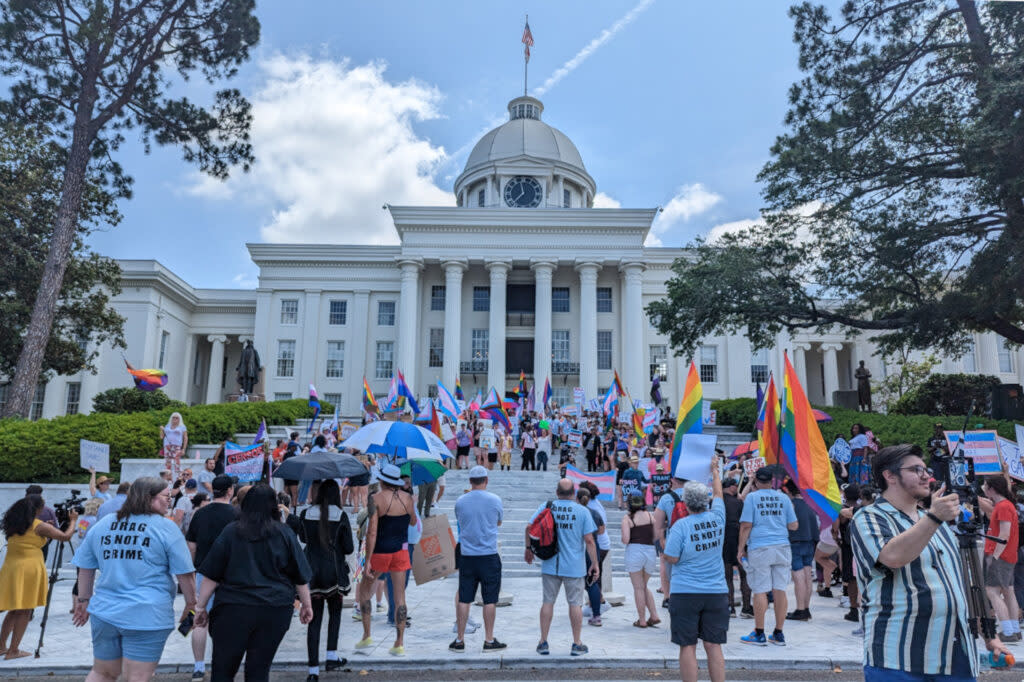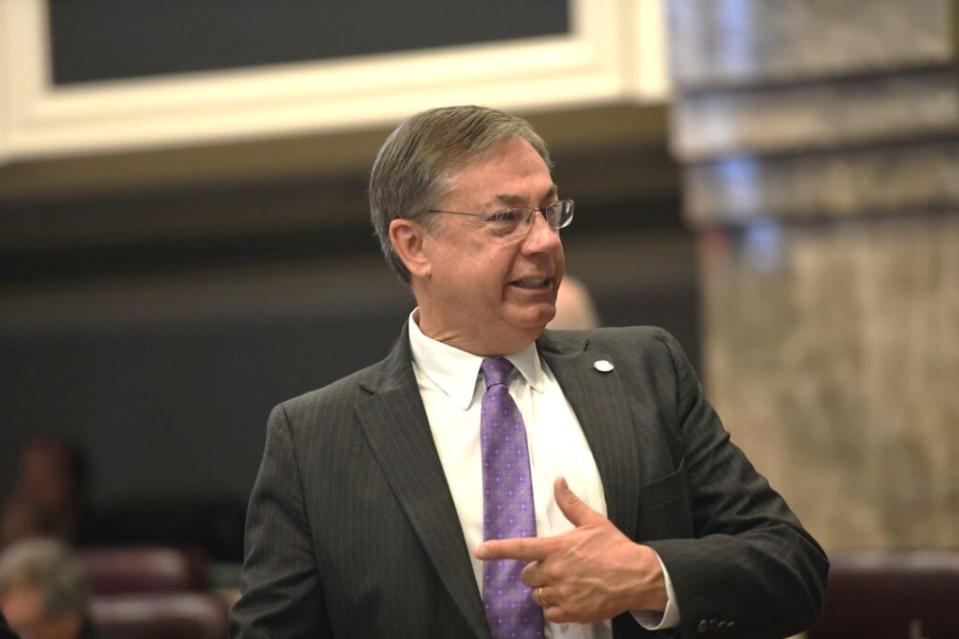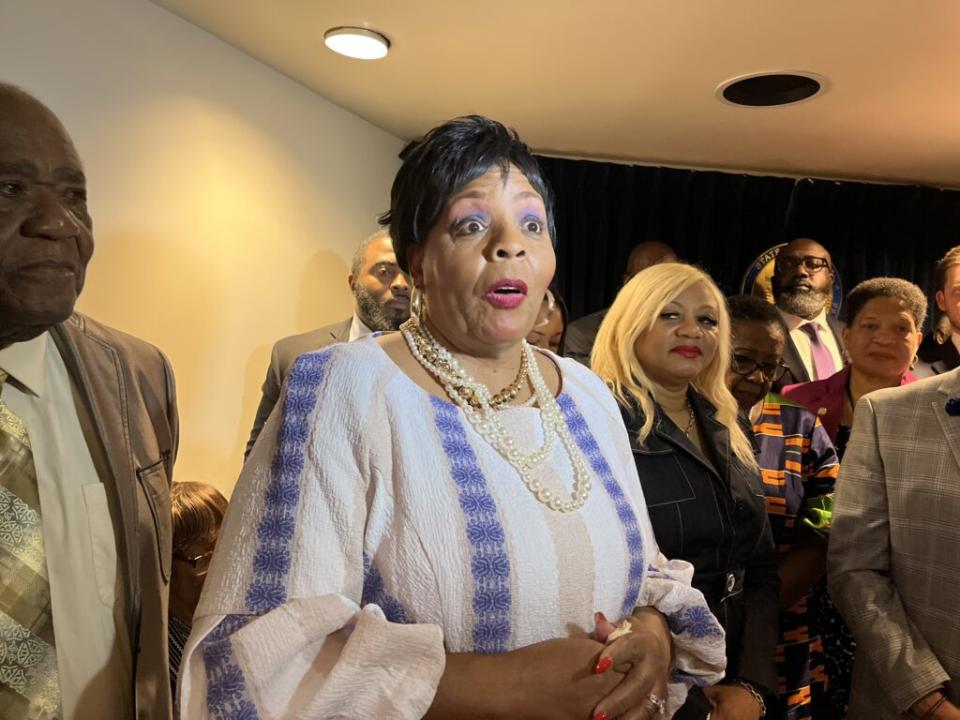Expansion of Alabama’s ‘Don’t Say Gay’ law dies on final day of legislative session

- Oops!Something went wrong.Please try again later.
"Drag me to the Capitol" protestors stand in from of the Alabama Capitol and advocate against anti-LGBTQ+ legislation on May 16, 2023. (Alander Rocha/Alabama Reflector)
A bill that would have expanded Alabama’s “Don’t Say Gay” law died on the final day of the 2024 regular session.
HB 130, sponsored by Rep. Mack Butler, R-Rainbow City, would have extended Alabama’s prohibition on discussion of sexual orientation and gender identity from kindergarten to fifth grade to kindergarten to eighth grade. It also would have banned flags or other insignia indicating gender identity or sexual orientation.
Butler said in a Friday phone interview that he didn’t know what the issues were in the final days of the session but said there was a filibuster in the Senate “which is not uncommon.”
GET THE MORNING HEADLINES DELIVERED TO YOUR INBOX
The legislation was the latest in a years-long attempt by Alabama Republicans to push LGBTQ+ Alabamians out of public life and in some cases restrict their health care. In 2021, the Legislature passed a ban on transgender students playing high school sports and the original “Don’t Say Gay” law, tacked into a bill restricting bathroom use by transgender youth.
The following year, the Legislature banned puberty blockers and hormones for use in gender-affirming care for transgender youth. The Legislature last year expanded the transgender sports ban to college athletics.
Katie Glenn, a policy associate with Southern Poverty Law Center, which opposed the bill, said in a phone interview Friday that it could have had a chilling effect which, she said, was emerging in some areas of the state.
“That chilling effect is absolutely what is intended by bills like HB 130,” she said. “it’s not actually to punish people, although it can be used to do that. It’s to scare people, to scare administrators, staff, teachers and students into hiding who they are while they’re at school.”
Butler also said he was not sure why the bill began moving again near the end of the session but said that bills “deemed a little controversial” are sometimes pushed back due to the amount they can take to pass.
“They shut down the House and the Senate,” he said.
But Butler said he would bring the bill back next year. He said that he has not met any parents who want the topics discussed in schools and claimed that “there is a move across this nation to sexualize our children.”
“Our schools in Alabama aren’t performing well enough to be going away from academics,” he said.
Legislative questions
The bill passed the House in late April and was in position for a final vote in the Senate. But Democrats repeatedly criticized the measure, and even some conservative Republicans had questions about its scope.
As originally filed, the bill would have extended the ban up to 12th grade. Butler described it in a House committee meeting as a measure to “purify” public schools, a statement he walked back after criticism from Rep. Barbara Drummond, D-Mobile. Drummond later amended the bill on the House floor to limit the grades to eighth grade.
In the Senate committee, senators had questions about the extent of the bill and potential constitutional violations, especially around the flag and insignia. One speaker suggested the bill was broad enough that it would ban rainbow stickers in parking lots. Sen. Larry Stutts, R-Tuscumbia, said he was “confused” after Butler said that parking lots were not part of school property. “The property is not the parking lot?” he asked.
“Well, we’re talking about the actual building,” said Butler.
The bill passed out of committee 5-2-2.
Butler said Friday that that concern is “ridiculous” and one of the committee members might have been having fun. He compared it to teachers being allowed to have political bumper stickers but not political signs in classrooms.
Glenn said the confusion could have contributed to the bill’s demise.
“There were lots of questions from legislators on both sides of the aisle,” she said.
She said the vague language bill does make it unclear what the impact of the bill would ultimately be.
Glenn said the bill eventually suffered from organizing from people in the state, as well as the work of Democratic lawmakers, especially in filibustering.
Carmarion D. Anderson-Harvey, Human Rights Campaign’s Alabama state director, said in a statement Friday that Alabama lawmakers should spend their time on other issues, saying that LGBTQ+ Alabamians would continue fighting “despite years of dehumanizing rhetoric and relentless attacks on our community’s existence.”
“Most Americans, in addition to Alabamians, see these bills for what they really are – disgraceful, MAGA-led attempts to recycle false and outdated tropes about LGBTQ+ identities,” the statement said. “Alabama has real issues facing education, voting rights, and criminal justice reform, and now it’s time that lawmakers turn their attention to those issues instead of wasting taxpayers’ money to demonize an entire community.”
“Don’t Say Gay” laws had spread around conservative states, though they have also brought litigation Florida, which passed a version of the bill in 2022, settled a lawsuit over it in March, according to the Associated Press.
The post Expansion of Alabama’s ‘Don’t Say Gay’ law dies on final day of legislative session appeared first on Alabama Reflector.



